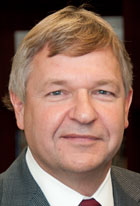Jeffrey D. Milbrandt, M.D., Ph.D., has been named head of the Department of Genetics and the James S. McDonnell Professor at Washington University School of Medicine in St. Louis.

Jeffrey Milbrandt
Milbrandt’s appointment was announced by Larry J. Shapiro, M.D., dean of the School of Medicine and executive vice chancellor for medical affairs.
“Jeff Milbrandt is one of the nation’s leading scientists applying genetic tools and genomic technologies to advancing the understanding of many biologic processes,” Shapiro says. “His discoveries have already led to several potential new therapeutic interventions. Jeff has devoted most of his career to Washington University and is just the right person to lead the Department of Genetics in the coming era.”
Milbrandt joined the School of Medicine faculty in 1983 as an assistant professor of pathology and medicine. He brings a strength in basic and translational science to his new position and an appreciation of the expanding role of genetics in the diagnosis, prognosis and treatment of disease.
As head of genetics, Milbrandt hopes to bolster faculty collaborations with researchers in clinical and preclinical departments and encourage investigations that utilize genetic analysis to understand basic mechanisms of disease.
“Genetics has led to many of the fundamental discoveries in biology and its future impact on the practice of medicine is virtually limitless,” Milbrandt says. “The collegial environment at the School of Medicine fosters the collaborations that will help us apply new genetic tools and discoveries to improve patient care.”
The genetics department is widely recognized for its study of fundamental genetic mechanisms that underlie biological processes, using model organisms such as yeast, algae and fruit flies. The department also includes the world-renowned Genome Center, whose scientists played a leading role in the Human Genome Project. More recently, these scientists have pioneered the decoding of cancer patients’ genomes to identify genetic changes at the root of the disease. Computational biologists in the department are highly regarded for their study of complex genetic networks and the statistical analysis of genetic data.
“I am truly honored to lead this outstanding department – one that has an esteemed history and a long list of accomplishments,” Milbrandt says. “Investigators in the department will use cutting-edge genetic technology to interrogate many aspects of disease, whether in humans, as part of population genetics studies or in animal models, where critical disease processes can be carefully dissected. Our goal is to help place Washington University at the forefront of genetic medicine.”
As head of the Department of Genetics, Milbrandt succeeds interim head Susan Dutcher, Ph.D., who has held the position since June 2006.
“Susan has done an outstanding job leading the department during this extended period,” Shapiro says. “I am grateful for her dedication and hard work, which has kept the department moving forward and on a path of great success.”
Milbrandt’s research has focused on neuronal signaling cascades stimulated by neurotrophic factors and on understanding how glial cells contribute to axonal regeneration after nerve injury. In a longstanding collaborative effort with Eugene Johnson Jr., Ph.D., professor of neurology, his laboratory discovered a family of growth factors that promote neuronal survival. One member of this family, neurturin, is being evaluated in phase II clinical trials in patients with Parkinson’s disease.
Milbrandt’s studies have also pointed to the vulnerability of axons – which transmit signals from one nerve cell to the next – in neurodegenerative diseases such as Parkinson’s, amyotrophic lateral sclerosis (ALS) and Alzheimer’s. Recently, he discovered an enzyme that can protect axons from a variety of insults, including chemotherapy drugs and mitochondrial damage. Milbrandt is working with biotech companies to test therapies that combine growth factors with axonal protective agents to treat neurodegenerative disease.
Milbrandt graduated from the School of Medicine in 1978, earned a doctorate in biochemistry and completed a residency in pathology in 1983 from the University of Virginia School of Medicine. He then returned to Washington University as an assistant professor of pathology and medicine. Milbrandt became a professor of pathology and immunology and of medicine in 1994. In 2005, he was named the first David Clayson Professor of Neurology.
Washington University School of Medicine’s 2,100 employed and volunteer faculty physicians also are the medical staff of Barnes-Jewish and St. Louis Children’s hospitals. The School of Medicine is one of the leading medical research, teaching and patient care institutions in the nation, currently ranked third in the nation by U.S. News & World Report. Through its affiliations with Barnes-Jewish and St. Louis Children’s hospitals, the School of Medicine is linked to BJC HealthCare.